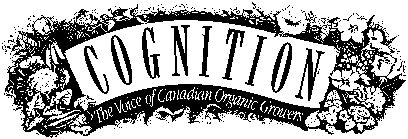

Cognition Index | Virtual Library
| Magazine Rack
Search
| Join the Ecological Solutions Roundtable
by Sandra Salmins
As you may have noticed from time to time in COGNITION’s "For Your Information" section, the Independent Organic Inspectors Association (IOIA) periodically offers inspector training sessions at various locations throughout North America. The sessions provide training for people wishing to become organic inspectors, and also serve as refreshers for practising inspectors.;
To my knowledge, the IOIA is the only organization which provides organic inspector training in North America. Although not all certification bodies (CBs) require inspectors to have IOIA certification, many do. The IOIA aims to promote consistency in the inspection process and serves to provide inspectors with good field techniques and uniform reporting methods.
IOIA training begins with a test – even before you leave the comfort of your home! This test explores whether your agricultural background, knowledge of organic techniques of farming, and perception of the role of an organic inspector are sound enough to allow you to proceed with the course. Without the submission of a resumé, the test is not complete. Assuming that adequate screening is done by the course providers, this is a good thing. It means that those taking the course already have a solid understanding of organic agriculture and are serious about becoming inspectors.
I enrolled in two three-day courses given in March, 1996, in Quebec. The IOIA offered intensive (in time), extensive (in material) training in 1) Farm Inspection and 2) Process Inspection. Although one can elect one or the other, prospective inspectors are encouraged to stay for both sessions to appreciate the whole process "from seed to shelf".
The thrust of the courses was to provide budding inspectors with as many tools of the trade as possible. The leaders provided presentations, discussions, guest speakers from the industry, room for a lot of questions, field trips to conduct mock inspections on real farms and/or processing plants, with full individual written reporting thereafter, and written tests. The courses allowed for a glimpse through farms and taught us what to look for, how to look and the importance of making accurate observations relevant to a report. It was emphasized that the role of the inspector is to observe and report rather than to make recommendations. It is the CB’s responsibility to review the inspector’s report and make the decisions regarding recommendations. The course instructors also stressed the importance of ethics and confidentiality, emphasizing that inspectors must be professional and accountable.
That’s not all. Those who complete the IOIA course are expected to apprentice. Organic Inspector apprenticeship involves participating in two site inspections accompanied by an experienced inspector. On the first inspection, the apprentice follows the inspector, makes observations and may ask some questions of the farmer/processor. On the second inspection, the apprentice leads the inspection, while the inspector makes observations of the apprentice. On this second visit, it is the apprentice who completes the full inspection report which is then reviewed by the experienced inspector before being submitted to the certifying body.
An IOIA trainee, having successfully completed the course (with scores above 75% on reports and exams) and having finished an apprenticeship, is now ready for the field. A good inspector can now make thorough, unbiased observations and provide concise, well-written reports on behalf of organic certifying bodies. The certifying bodies, in turn, will be able to make well informed decisions regarding the designation of organic certification to a farm or plant or recommendations for changes to be made in an operation, either to improve its functioning with respect to organic standards or to achieve certification.
Qualified, well trained, ethical organic inspectors are an important link in our organic industry.
Sandra Salmins won COG’s Mary Perlmutter Scholarship in 1992 and is the FYI editor for COGNITION. She successfully completed the IOIA training session and would welcome any questions or comments about the course. See pg. 26 for contact information
Copyright © 199?.
Sandra SalminsReprinted with permission. All rights reserved.
Info Request | Services | Become EAP Member | Site Map
Give us your comments about the EAP site
Ecological Agriculture Projects, McGill University (Macdonald
Campus)
Ste-Anne-de-Bellevue, QC, H9X 3V9 Canada
Telephone:
(514)-398-7771
Fax:
(514)-398-7621
Email: info@eap.mcgill.ca
To report problems or otherwise comment on the structure of this site, send mail to the Webmaster